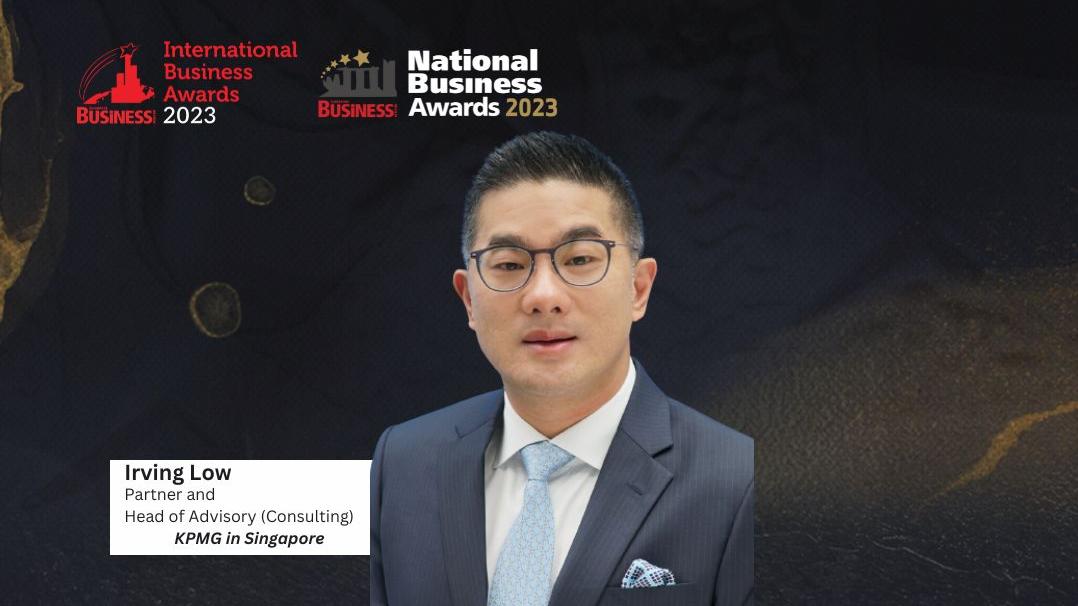
Business leaders must develop ‘blueprint’ for their ESG approach, says KPMG’s Irving Low
Low mentioned that ESG efforts can be a part of companies’ investment for long-term recovery.
Irving Low is Partner and Head of Advisory (Consulting) at KPMG in Singapore. He has been with the firm for over 30 years. In his current role, he is responsible for its advisory businesses and practices across management consulting and risk consulting.
His key area of practice is in corporate governance, where he is also KPMG’s Asia Pacific Leader for Board Advisory Services. In addition, he also sits in KPMG in Singapore’s senior executive committee, which oversees the firm’s strategic and operational excellence.
Low has undertaken numerous corporate governance reviews for both public and private organisations amid renewed focus in this area. He is a frequently invited guest and speaker at board meetings and presentations as well as public forums on corporate governance.
In an interview with the Singapore Business Review, he shared his insights on what Singapore-based companies can expect in 2023, how they can measure success as well as the role that ESG considerations are going to play in the business landscape.
“With ESG becoming an intrinsic business imperative, delaying key ESG efforts could make businesses more reactive in the future, rather than help them lead the way with greater transparency, resilience and sustainability,” Low said.
The Ministry of Trade and Industry expects Singapore’s growth this 2023 to ease between 0.5% to 2.5%. How do you think this economic forecast will affect businesses in the city-state for the year?
Many economists are expecting slower global economic growth in 2023, due to the rise in interest rates in response to higher inflation. The weaker external economic environment could weigh on the outward-oriented sectors in Singapore, but recent data has also shown optimism and given cause for hope that the global economy is gradually recovering.
In a similar vein, KPMG’s 2022 CEO Outlook, which surveyed more than 1,300 CEOs at the world’s largest businesses about their strategies and outlook, revealed that 58 percent of global CEOs expect a mild and short recession.
The survey also showed more than half of Singapore CEOs surveyed have paused or are reconsidering their existing or planned ESG efforts as a result of economic uncertainties. Companies that had to cut costs when recessionary signs were emerging should certainly start thinking about investing in long-term recovery, including resuming ESG efforts.
With ESG becoming an intrinsic business imperative, delaying key ESG efforts could make businesses more reactive in the future, rather than help them lead the way with greater transparency, resilience and sustainability. This may also be a good time for companies to re-evaluate their strategies or even restructure their business models to create more flexible and resilient businesses moving forward.
Stakeholder demand for reporting and transparency on ESG issues has increased significantly, with 72 percent of global CEOs noting that stakeholder scrutiny on ESG will continue to accelerate. Businesses that embrace ESG are increasingly better able to secure talent, strengthen their employee value proposition, attract loyal customers and raise capital. ESG has gone from a nice-to-have to integral to long-term financial success.
What do you think are some of the main challenges that Singapore’s business landscape faced for the past year? How can industry leaders and key business figures address them this year?
Some of the main challenges that Singapore businesses could be facing today include evolving attitudes towards work, technological advancements and the continued impact of COVID-19. The changing demographics in the workforce and social needs have driven a shift in attitudes towards work, with those entering the workforce today placing more focus on developing a sense of purpose and alignment with their organisation’s values. Climate change, sustainability and social equality are some of the issues that employees may be looking to make a difference in. Hence, there is an expectation for firms to also offer opportunities to do work that positively impacts the environment and society.
With a global war for talent, companies must also offer a positive working environment that is appropriate for new ways of working – this involves one where employees feel invested, respected and rewarded for their efforts. This should also include job flexibility, empowerment, authentic leadership, diversity, learning & development and having strong corporate purpose and values.
In a post-pandemic era, companies should also continue to place emphasis on innovation and productivity, such as by developing a reskilling and upskilling strategy for in-demand and emerging skills. This will help to get their workforce ready for the 4th Industrial Revolution.
This year, what will be your key performance indicators in measuring businesses’ growth and success? How can businesses attain these?
Value creation and sustainability - in all forms - will be particularly key to measuring success and growth in the new era of doing business. With this, setting a strong tone from the top for ESG will be critical. Increasingly, business leaders will need to be able to articulate their company’s ESG strategy and identify the areas that are truly material. The tone that leaders set at the top will also trickle down on employees’ attitudes towards ESG issues.
To drive measurable growth, businesses will need to develop a “blueprint” for their ESG approach and integrate ESG into the operating model. This will ensure that ESG is embedded as part of their organisation’s DNA.
At the same time, having a digital transformation strategy that can be adapted to changing times is another area that CEOs and the Board will have to pay close attention to. This similarly starts with a shared corporate vision and strategy, which will have to be refreshed amid changes in the world, markets, technology, and customers’ needs.
As industries further recover and a seemingly “return to normal” work setup is seen, how can businesses in Singapore ensure that this is sustainable?
Talent will be a differentiator in the future economy. Practices such as work-from-home, telecommuting and staggered work hours are now more prevalent, and globally, employers are embracing flexible work arrangements as part of the future of work. However, to build thriving and sustainable enterprises that can survive future disruptions, companies will need to go beyond these arrangements and demonstrate continued investments in growing their talent pool, while creating opportunities for learning, deeper interactions and meaningful connections at the workplace.
For instance, KPMG introduced its Sustainable Future of Work strategy this year, with the key prongs of decarbonisation, talent and data. In the area of talent, the firm has committed investments into grooming talent who can lead the market in cross-sector trends and transformative expertise, while uplifting industry baseline standards for professional services. This includes investing S$25 million into salary adjustments this financial year for majority of its Singapore workforce, with starting pays for entry-level professional staff increasing by up to 20 percent. The firm has also launched its S$30 million lifelong learning programme, focusing on developing futurist capabilities and harnessing skillsets, such as data and digital literacy as well as valuing and creating measurable impact.
With uncertainty here to stay in the post-pandemic era, businesses will need to rethink how they can keep an engaged and motivated workforce, as these will directly influence their bottom line and their impact on the environment and society.
With your years of consulting experience, what do you think are some of the trends that companies can see in the business landscape this year? How can they seize these opportunities?
Sustainability matters for all businesses and this will be a trend that will dominate the business landscape in the coming years. Incorporating ESG considerations into business operations is not just about enhancing a company’s brand and building customer loyalty, but also about improving access to capital, reducing the cost of borrowing and winning new business. A focus on ESG also puts companies in a better position to face future regulatory requirements. It provides added agility in governance, culture and operating models that will be key in a fast-paced environment.
That said, inflationary pressures and supply chain disruptions will be issues that businesses will have to grapple with. Geopolitical tensions have seen nations turn inward and become skeptical about cooperation and interdependence. Hence, companies will need to regularly assess their exposure to supply chain shocks, manage their organisation’s response to these pressures, optimise their capital structures and monitor regulatory developments.
In KPMG’s latest Global Tech Report 2022, almost all global tech leaders reported that their digital evolution had improved performance and profitability over the last two years. Organisations shared that they are poised to invest heavily in emerging technology and digital transformation, despite tense operating conditions. Proficiency in new and emerging technologies will be key to defending market share by enhancing customer experience and business resilience.
As a returning judge for this year’s awards programme, what are you expecting to see amongst this year’s entries?
ESG and digital transformation will likely take centre stage this year, especially since initiatives in these two areas are becoming more intimately linked. For many organisations, a key prong of their ESG strategy is having the capabilities to collect, manage, and analyse vast amounts of data to track ESG progress as well as monitor ethical and responsible business practices.
With economic uncertainties ahead, consolidation to ensure a stronger balance sheet will also be a priority for companies. Maintaining adequate liquidity to sustain the business through a potential downturn will be paramount and companies with sub-optimal balance sheets should certainly prioritise options for strengthening them.
























 Advertise
Advertise










